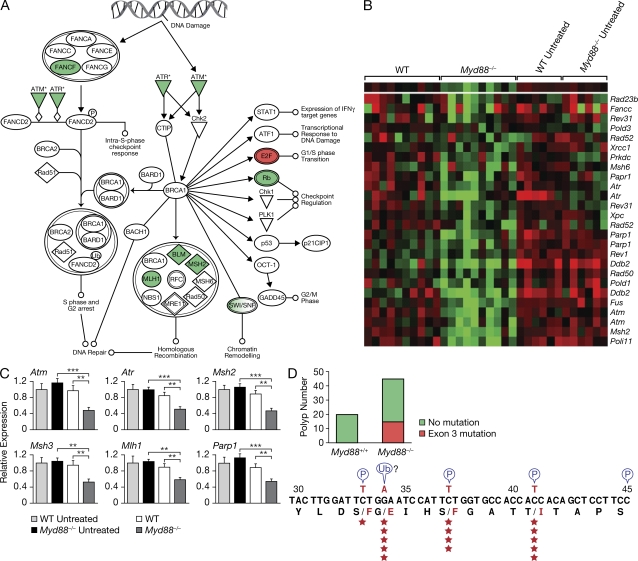Figure 4.
Increased DNA damage is elicited by AOM/DSS treatment in Myd88−/− mice compared with WT mice. RNA was extracted from cohorts of 10 WT or Myd88−/− mice per group treated with AOM/DSS and from cohorts of six nontreated WT or Myd88−/− mice/group. Samples were processed using the Affymetrix microarray platform, and analyzed using the Ingenuity Pathway and Cluster and TreeView Programs. A significant decrease in DNA repair gene expression profile was observed in Myd88−/− mice after AOM/DSS treatment compared with treated WT mice (A and B). The data shown in A and B were obtained from the microarray experiment that was performed once. The pattern of DNA repair gene expression was subsequently confirmed using real-time RT-PCR. The gene expression was normalized to Gapdh levels, and the expression of each gene relative to untreated WT mice is depicted. One out of two representative experiments is shown (C). Data represent means ± SE. **, P < 0.01; ***, P < 0.001. For analysis of β-catenin mutations, cohorts of 15–20 mice/group were subjected to AOM/DSS treatment (two DSS/cycles). 60 d after AOM administration, individual polyps were resected, and DNA was extracted and analyzed for mutation of β-catenin using specific primers for exon 3. The numbers of polyps exhibiting point mutations at positions 33, 34, 37, and 41 in exon 3 are indicated in the scheme by the stars (D). The polyps analyzed for β-catenin mutations were obtained from multiple experiments and each polyp was sequenced for mutations once.

